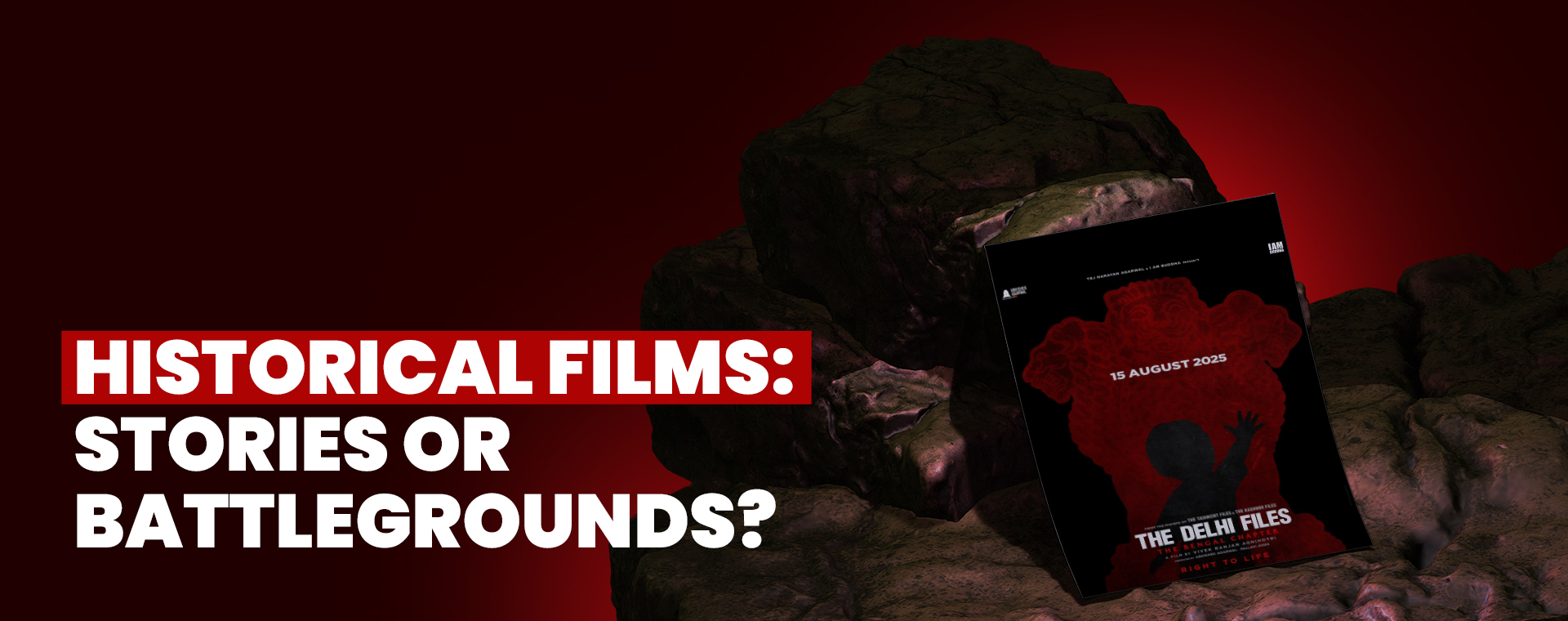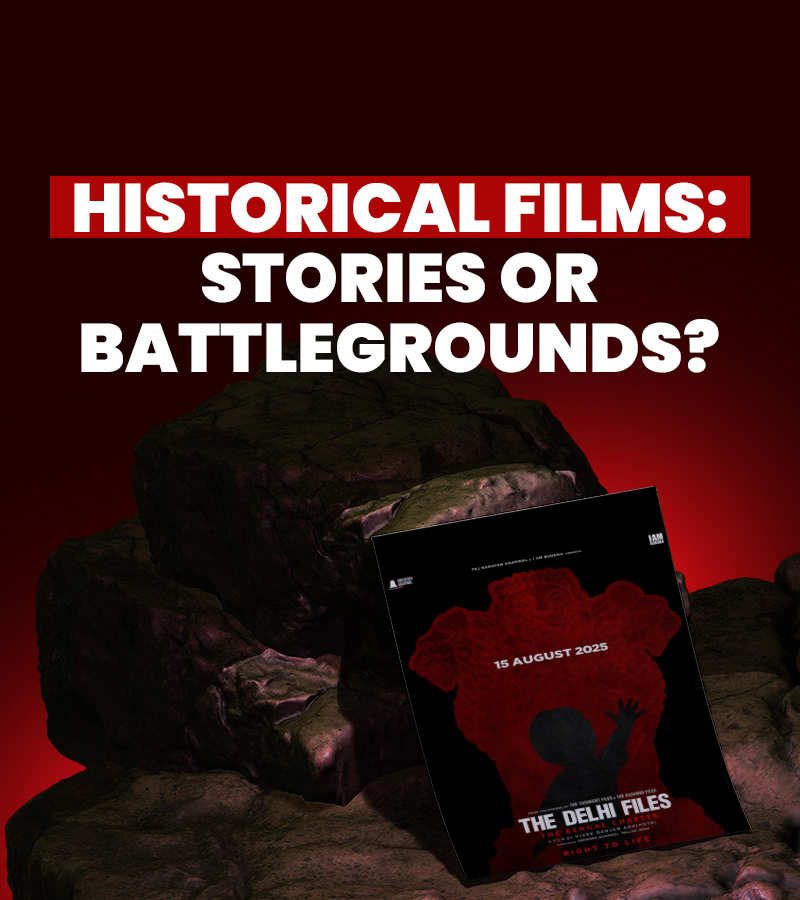

Why Do Historical Films Always Ignite Controversy?
From Chhaava to The Kashmir Files, why do audiences feel so intensely about historical films?
Few things divide public opinion like a controversial film, and nobody knows this better than Vivek Ranjan Agnihotri. The moment a movie claims to be “based on real events,” it transcends entertainment and becomes a hot topic for cultural discussion and, sometimes, even a battleground for competing narratives.
We’ve seen it in the past. The Kashmir Files stirred passionate discussions about historical accountability. Padmaavat faced outrage over historical interpretation. Even films like Jodhaa Akbar and The Legend of Bhagat Singh have faced scrutiny over their cinematic portrayal of history.
But why do historical films fuel such intense debates? And what does that say about our collective relationship with history?
Today, we’re here to explore why films like The Delhi Files spark controversy, conversation, and reflection.
1. History Is Never Just History; It’s Identity
History isn’t just a record of events; it’s an account of deeply personal stories. It shapes how nations see themselves, how communities define their struggles, and how individuals build relationships with their heritage. When a historical depiction touches the silver screen, it isn’t simply revisiting the past but instead reshaping the lens through which people view their own identity.
For instance, narratives about partition, colonial rule, or regional histories tend to provoke strong reactions because they’re tied to generational memory. People don’t just come to watch these films. They perceive themselves as reflections of their own community’s struggles, resilience, or legacy. Recently, Chhaava was the perfect depiction of someone’s lived history, respecting history while also presenting a dramatic narrative.
In this way, history on film isn’t just storytelling; it’s a referendum on how we remember the past.
2. The Power of Perception: Who Tells the Story Matters
One of the most significant reasons why historical films attract controversy is because of the perspective they present. Who is telling the story? Whose version of history is being represented? Whose voice is being amplified, and whose is left out?
Take any major historical film, say Padmaavat, and you’ll find that the strongest debates emerge not based on what happened, but how it’s being portrayed. Are heroes being villainised? Are villains being rehabilitated? Is a particular community being represented fairly?
Since history itself is often documented from multiple viewpoints; accounts of victors, political motives, fighters, and beyond, there is no single, absolute truth. Films, by nature, require creativity, and those choices inevitably shape how audiences perceive historical events.
This is why some say a film brought forgotten truths to light while others critique how the film distorted history. It’s all about the lens through which the story is being narrated.
3. The Line Between Fact and Fiction
At the heart of many debates around historical films is the delicate balance between fact and fiction. Filmmakers take creative liberties to make a story engaging, combining multiple real-life figures into one character, dramatising certain events, or filling in gaps where historical records are unclear.
While these choices make for a compelling narrative, they can also become points for criticism. The audience’s expectation of absolute historical accuracy clashes with the filmmaker’s goal of creating a seamlessly satisfying story.
This is why historical films often include disclaimers stating that they are “inspired by true events” rather than being strict documentaries. But despite this, audiences still hold them to a higher standard than fictional narratives.
In the case of The Delhi Files, the film explores actual incidents like Direct Action Day and the Noakhali riots—events that shaped modern India but remain complex and emotionally charged. The challenge lies in depicting these stories truthfully while also crafting a film that resonates with modern audiences.
4. Films as Agents of Social and Political Upheaval
Historical films like these hold a mighty power—the ability to reignite public discourse over past events. They bring forgotten historical events back into mainstream spotlights, often encouraging society to confront uncomfortable truths.
For example, The Kashmir Files led to renewed discussions on the exodus of Kashmiri Pandits—an issue that had been sidestepped by mainstream media for aeons. Padmaavat reopened debates about historical valour and artistic expression. Article 15, though not a historical film, used real-world references to restart conversations around caste discrimination.
Films have the ability to challenge official narratives, introduce new perspectives, and even influence political discourse. Think of them as cultural corrections, pushing against selective amnesia and bringing forth lesser-known voices in history.
However, this also makes such films a battleground for ideological wars. Political groups, activities, and historians present conflicting views on how history should be told. What some see as truth-telling is an act of revisionism for others. This tension is what makes such films so influential and so controversial.
5. The Audience Isn’t Just a Passive Viewer
Ultimately, the debate around historical films isn’t just controlled by filmmakers. We, as viewers, have a decisive role to play. Our collective response to the film determines whether it becomes a celebrated masterpiece, a subject of outrage, or a starting point for deeper discussion.
Social media, especially, fans such debates, blowing them up like never before. A film no longer exists in isolation; it becomes a part of a larger cultural conversation, dissected in X (Twitter) threads, YouTube analysis, and think pieces.
The real question, then, is how we engage with these films. Do we watch them critically, questioning the narratives they present? Do we allow space for multiple perspectives? Or do we see them through the lens of bias, accepting what aligns with our point of view and rejecting what challenges it?
Final Thoughts
Historical films are meant to spark controversy and healthy debate. Whether it’s The Delhi Files, Padmaavat, Chhaava, or any other film depicting real-life events, conversations around these topics reveal something deeper about us—not just what we believe about history but also how we engage with it.
In a way, these films serve as a reminder that history isn’t just something we read in textbooks. History is something we actively shape through conversations, memory, and representation. The debates may heat up, but they create room for dialogue. Because when a film makes people talk, it means it has struck the right chord. And isn’t that the whole point of storytelling?






